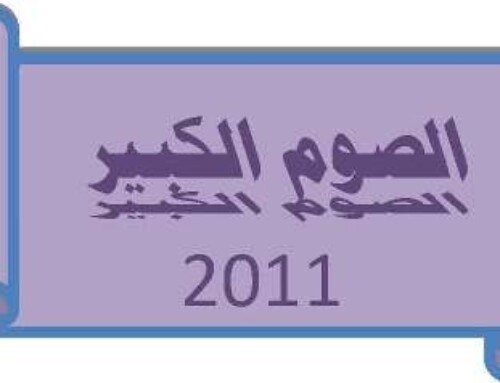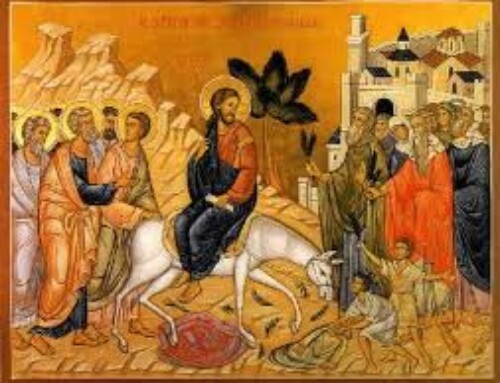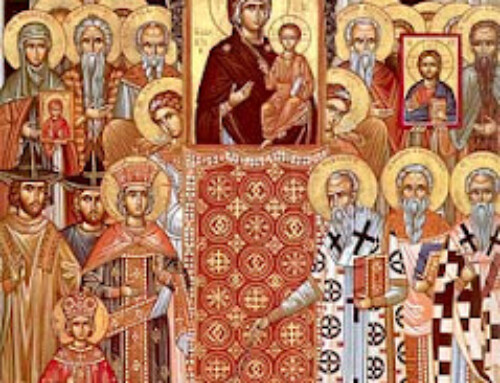From The Word Magazine,February 1991 – page 11-12
GREAT LENT IS COMING!
by Father David Barr
Once again we will enter into Great Lent, the season of fasting and preparation for the Feast of Feasts, our Lord’s Resurrection from the dead. As Orthodox Christians, Great Lent is an important time of the year, for this is when we make an even greater effort to pursue the spiritual life. It is the time when our attention returns to repentance and self-denial. We have additional Church services, and they tend to be longer than normal. Kneeling and prostrations become a greater part of our liturgical worship. In order for you to participate in this important time of the year, perhaps it is good to look at the origins of Great Lent and how it developed into what we experience today Knowing why we do things is often helpful in participating in the life of the Church.
What we experience today as Great Lent is the result of a long and complex development. In the middle of the second century the Church knew a short fast before Pascha, however the length and nature of this fast varied from place to place. The fast before Pascha was probably one to three days in length. By the middle of the next century it seems as though this fast extended in several places to the entire week before Pascha, what we call Holy Week. In the Didascalia Apostolorum we read: “… “therefore you shall fast in the days of Pascha from the second day of the week (i.e., Monday) and you shall sustain yourselves with bread and salt and water only up to the ninth hour until the fifth day (i.e., Thursday) … But on Friday and Saturday fast wholly and taste nothing’ (ed. RH. Connolly 1929, p. 189). The next historical information we have on the lenten fast comes 75 years later in a brief reference to Lent in Canon 5 of the First Ecumenical Council of Nicea. By the fourth and fifth centuries, it is easy to see that the pre-paschal fast sometimes called the Forty Days was an institution within the Church.
Although there are different theories as to how Great Lent developed, we know that it is found very early in Church history It also seems evident that there are two themes that come together in Lent: education of the catechumenare and preparation for the Resurrection of Christ. The first is seen particularly well in the Presanctified Liturgy. This service contains several prayers for the catechumens, those who are preparing for baptism. Great Lent was an important time of preparation and education for those waiting to be baptized on Holy Saturday Lent was the final intensive period of education (catechesis) before being initiated into the Christian community through baptism. Those preparing for this would fast and pray for a period of time before their baptism. It appears that the Church, in their support for the catechumens, would join with them in this time of fasting and prayer.
The second theme of Great Lent is found in preparation for the Feast of Feasts. Within Orthodox tradition, the concepts of preparation and fulfillment go hand-in-hand. Fulfillment results from intensive preparation. In the same way we find great fulfillment in a gourmet meal that has required substantial preparation, we can expect to find fulfillment in the Feast of Christ’s Resurrection only if we have prepared for it. One of the main reasons people find little fulfillment in the Church is that they have done little preparation. True joy and celebration come out of intense preparation. Great Lent offers each of us the opportunity to prepare ourselves to see the true and real significance of the empty tomb of Christ. The fast gives us the chance to behold things that cannot be seen with unprepared eyes. Lent enables us to rejoice and participate in Christ’s Holy Resurrection in a mystical way that is beyond words.
Great Lent is much more than giving things up that we like (like chocolate, soft drinks, potato chips, etc.). Inasmuch as the Fast prepares us for the Feast of Christ’s Resurrection, it also helps prepare us for our own death and resurrection as well as the great Day of Judgment because self denial is the beginning of the Christian life. Our Lord instructed his disciples: “If any one would come after me, let him deny himself and take up his cross and follow me” (Mark 8:34). To follow Christ is to practice self denial. In fact, we cannot follow Him or take up our cross unless we first deny ourseif. It is so obvious, and vet so difficult. We cannot do whatever we want and still follow Christ. Great Lent enables us to get a grasp on this and realize the need of self denial and discipline in our lives.
Following you will find the Church’s regulations on fasting during Great Lent. Use this to help you and your family decide how to keep the Great Fast in your home. Remember that to a certain extent, lenten food should be somewhat boring, after all, we are attempting to refrain from the passions — not feed them. There are two extremes to beware of— not doing enough and doing too much. Not doing enough should be obvious. The truth is that almost all of us can keep the fast fairly strictly At the very least, we can abstain from meat for the duration of Lent (and that can include children as well). It is important that we do not too easily excuse ourselves from keeping the fast. On the other hand, we must be careful not to be too strict, falling into legalism or into despair ifwe fail to keep it. It is better to take on a smaller portion of the fast and keep it than to take on the whole and utterly fail in the attempt. Decide how you will keep the fast and then do what you decide. Some suggestions that you might want to consider would be to follow the regulations on fasting for the first, middle, and last (Holy Week) weeks of the Fast while relaxing a bit on the other weeks. Perhaps you should be stricter on the weekdays, especially Wednesday and Friday and more lenient on the weekends. Decide within your family how you can participate in the Lenten Fast, and then do it. If you have any questions about how you should keep the Fast in your home, talk to your parish priest or Father Confessor.
Father David Barr is pastor of Holy Resurrection Church in Tucson, Arizona.



